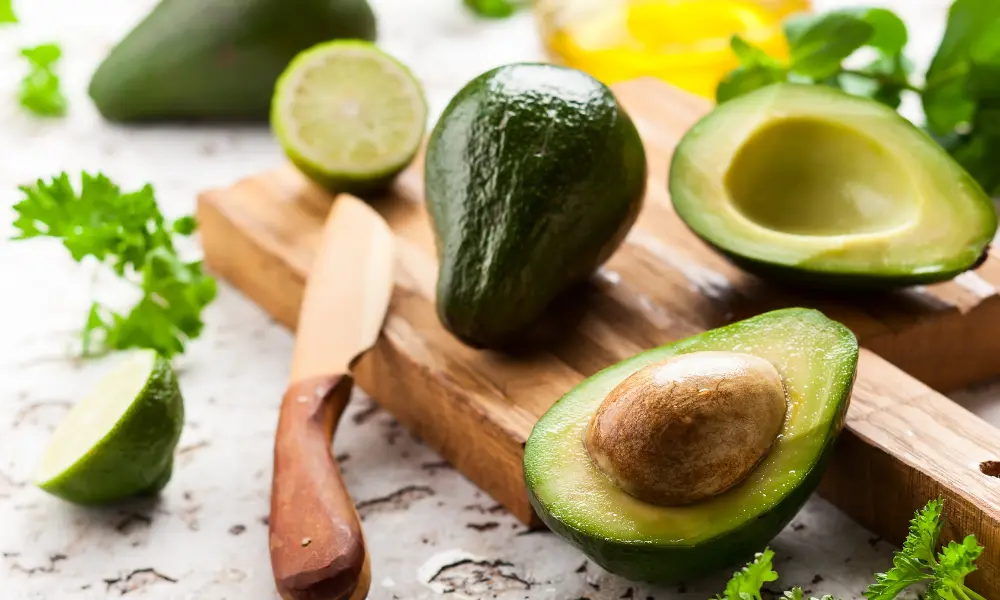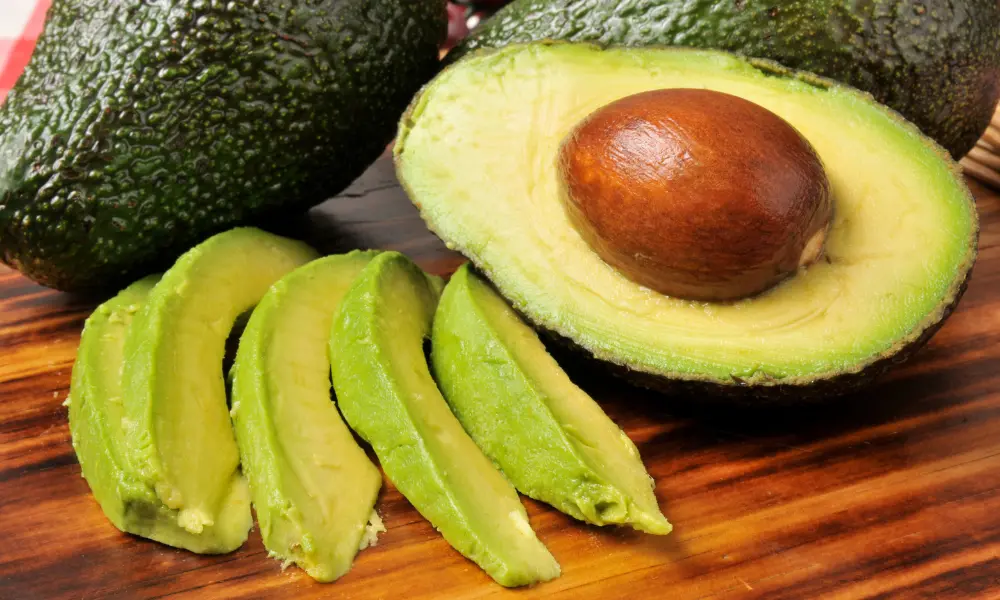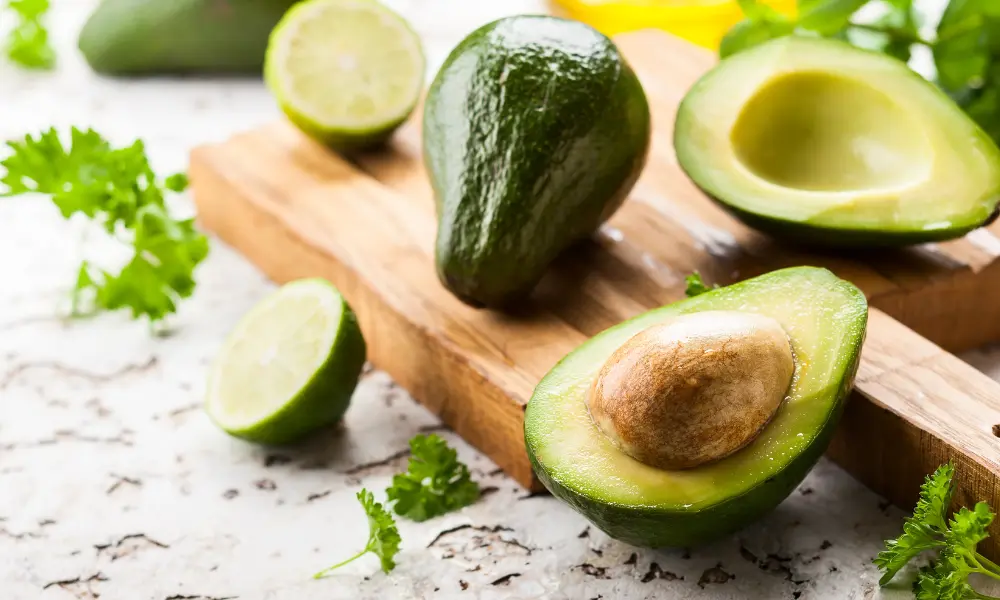Can dogs eat avocado? Is avocado safe for dogs to eat? Understanding what’s safe for our dogs is crucial for their well-being. When it comes to avocados, it’s essential to be mindful of your dog’s health.
While avocados contain monounsaturated fats and a plethora of vitamins, certain parts can pose risks to your dog. The mesocarp, found in the inner area of the avocado, is the only portion considered safe for your pup. However, even with this, moderation is key.
Large portions of avocados, especially the leaves and skin, contain a toxin called persin. This toxin can lead to vomiting and diarrhea in dogs. Additionally, the avocado seed poses a choking hazard, so it’s best to keep it out of your dog’s reach.
Even though avocados are technically non-toxic, it’s advisable to err on the side of caution. While the fruit is nutrient-dense, our canine companions have different digestive systems than we do. So, when pondering whether dogs can have avocado, the answer is a cautious no.
If your dog happens to ingest an entire avocado or exhibits any concerning symptoms, reaching out to your veterinarian is the best course of action. Your vet can provide guidance tailored to your dog’s specific needs.
Can Dogs Eat Avocado?

It’s crucial to be aware that avocados, commonly enjoyed by us, can pose potential risks to our canine companions. The various parts of the avocado, including the fruit, pits, leaves, and the plant itself, contain a substance called persin, which can be harmful to dogs.
The toxin is primarily concentrated in the leaves, bark, pits, and skin of the avocado, with the flesh containing a lesser amount. Even though the risk of Persin toxicity in dogs is low, it’s advisable to avoid avocados altogether. Additionally, avocados can cause stomach upsets in dogs.
Considering these potential health risks, we recommend steering clear of avocados and opting for safer fruit alternatives for your dog. Your pet’s health and safety are our top priorities.
While the exact lethal dose of persin for dogs is not well-established, consuming large amounts of it may lead to undesirable outcomes such as vomiting, diarrhea, and myocardial damage (akin to a heart attack in humans). Moreover, the high fat content in the avocado flesh can result in gastrointestinal upset and pancreatitis in dogs if ingested excessively.
Calorie-dense avocados can also contribute to weight gain in dogs, presenting an additional concern for their overall health. Furthermore, the stone at the center of the fruit poses a choking hazard for dogs, emphasizing the importance of keeping avocados out of their reach.
How Much Avocado Can My Dog Eat?
If you’re pondering whether it’s safe to share some avocado with your furry friend, the answer is yes, with a few considerations. It’s crucial to control the amount you offer and ensure your pet avoids the skin, leaves, or seed, focusing solely on the fleshy innards.
Determining a precise safe quantity of avocado for your dog isn’t straightforward. It varies based on your dog’s size and overall health. Larger dogs can handle more than smaller ones. When treating your dog to avocado, opt for small serving sizes of the mesocarp, and consider dicing it for ease of consumption.
If avocado becomes a regular treat, exercise caution. Despite its beneficial fats, it is still high in calories, which could contribute to weight gain and elevate the risk of diseases like diabetes.
What If Your Dog Eats Avocado?

You might already know about the potential hazards of feeding avocados to dogs, leading you to wisely refrain from offering any or limiting their intake to safe amounts.
It’s important to know that a small nibble of avocado flesh is generally considered safe for your furry friend. In terms of toxicity, the flesh contains the lowest levels of Persin, making it less concerning in small quantities. However, caution is advised when larger amounts are consumed.
There is a documented case where two dogs experienced heart failure after prolonged ingestion of substantial amounts of avocados. Hence, it’s crucial to monitor and limit your pet’s avocado intake to mitigate potential risks.
However, it’s crucial to recognize that even if you conscientiously avoid giving avocados to your furry friend, there remains a risk that they may come across one unintentionally. This can happen if avocados are left within their reach, be it on the kitchen counter or in the garbage.
Choking Hazard
It’s crucial to be aware that if your furry friend happens to ingest the seed, there’s a potential risk of choking. To put it into perspective, the size of the seed is comparable to that of a ping-pong ball. Ensuring the safety of your pet is of utmost importance, so please exercise caution to prevent any unwanted incidents.
Myocardial Damage
I’d like to bring to your attention a significant concern related to feeding avocados to dogs – the risk of myocardial damage. This refers to potential harm to the myocardium, commonly known as the heart muscle.
It’s crucial to be aware of the potential consequences associated with avocados in a dog’s diet, and myocardial damage is a serious matter. Any harm to the heart muscle can have severe implications for your pet’s overall health.
Dangers Of Persin
When your beloved furry friend indulges in the skin or leaves of the avocado fruit, there’s a potential danger of ingesting excessive persin. An overdose of this substance may result in your dog developing an upset stomach. This can lead to discomfort, and in some cases, your pet might experience vomiting or diarrhea.
As a responsible pet owner, you are likely aware that persistent vomiting or diarrhea can lead to dehydration, bringing along additional health risks for your cherished pet. It’s crucial to be mindful of these potential hazards to ensure the well-being of your canine companion.
The Risks of Dogs Eating Avocado
Understanding the potential risks associated with dogs consuming avocados is crucial for responsible pet ownership. While the avocado’s flesh is generally deemed safe for your furry friend, it’s essential to be mindful of moderation.
Avocados boast a high fat content and are densely packed with calories. While these can be beneficial in moderation, excessive intake may result in pancreatitis and obesity for your dog. It’s a reminder that even good things should be enjoyed in moderation.
Avocado Plant Components: Leaves, Stem, Seeds, and Skin
Understanding the various components of the avocado plant is crucial, especially when it comes to the well-being of our canine friends. Every part, including the bark, leaves, stem, seeds, and skin (even the flesh to a lesser extent), contains a substance called persin. This compound is mildly toxic to dogs, and it’s the reason avocados often have a bad reputation in relation to pets.
It’s worth noting that our furry companions are generally resilient to persin. However, it’s still advisable to exercise caution. For a dog to experience the toxic effects of persin, they would need to consume a substantial amount of avocados. To err on the side of caution, it’s wise to keep your dog away from the avocado plant.
The concentration of persin is significantly higher in the plant’s seeds, stem, leaves, and bark compared to the flesh. Therefore, if you have an avocado tree in your yard, it’s essential to prevent your dog from nibbling at it. Additionally, promptly clean up any fallen branches, leaves, or other plant parts to ensure your dog’s safety.
The Pit
Surprisingly, the primary threat avocados pose to dogs is not the fruit itself but rather its pit. The pit, also known as the avocado seed, is the sizable object at the avocado’s center, akin to a golf ball in size. Although it’s usually removed and discarded, it can become a potential hazard for your dog if not properly disposed of. Beyond containing persin, the real danger lies in its potential to cause choking.
The pit’s dimensions make it an ideal candidate for getting lodged in your dog’s throat, obstructing the airway. Even if it manages to pass through the esophagus, there’s a risk of it getting stuck in the intestinal tract, leading to a severe blockage.
Dog Foods that Contain Avocado
Understanding what’s safe and healthy for your canine companion is crucial. When it comes to avocados and dogs, the only scenario where it’s safe is when it’s part of a well-balanced commercial dog food. These specialized products often include avocado oil or avocado meal, which is essentially dried and ground avocado flesh.
Importantly, these ingredients contain minimal Persin, making them entirely safe for your dog when consumed at the levels found in these dog foods. It’s worth noting that these avocado-based products can be beneficial for your dog’s overall health. They are rich in essential vitamins such as A, B6, C, and E. Additionally, they provide fiber, promoting digestive health, and essential fatty acids that contribute to a healthy coat and skin.
While your furry friend can’t indulge in guacamole or enjoy a slice of avocado toast, there are numerous other human foods that are safe for them to enjoy. Explore our helpful daily feeding guides for more information on providing a well-rounded diet for your pup.
If you’re curious about how other foods may impact your dog’s diet, consider exploring whether cheese is suitable or if tomatoes are a healthy addition. Ensuring your pet’s nutrition is both safe and enjoyable is key to fostering their well-being.
Keeping Avocado Away From Dogs

If avocados are a staple in your household, it’s crucial to inform all members about the potential hazards of sharing human foods with pets, particularly avocados. Consider creating a list of safe and unsafe fruits and vegetables for dogs, placing it prominently on your fridge for quick reference.
For those with curious dogs who tend to explore the trash, investing in a dog-proof garbage can is a practical solution. This helps prevent any unintended access to harmful items when you’re not supervising.
To replace avocados in your dog’s diet, explore alternative treats specifically designed for canine consumption. Additionally, consider incorporating avocado-themed elements into your pet’s environment, such as a dog bed shaped like an avocado. For grooming, tap into the moisturizing benefits of avocado oil by selecting dog shampoos containing this ingredient. Alternatively, opt for a dog-friendly detangler enriched with avocado oil and omega-3s.
Steps to Take Following Accidental Pet Ingestion
In the event of an accidental ingestion by your pet, it’s crucial to be vigilant and take prompt action. If your pet consumes the fruit’s pulp, there’s likely no cause for concern, as this usually doesn’t lead to any adverse effects. However, if your dog happens to eat the skin or leaves, it’s imperative to reach out to your veterinarian without delay.
Contacting your veterinarian is crucial as they possess the expertise to guide you on the necessary steps to prevent any serious reactions or potential complications like vomiting or diarrhea. Your vet will also educate you on recognizing signs of a more severe problem, enabling you to closely monitor your beloved pet. In cases where emergency medical attention is required, your veterinarian can provide valuable guidance on where to seek immediate help.
Additionally, if you observe any signs of breathing difficulties in your pet, especially in connection with a missing avocado, it could indicate the ingestion of the seed. In such a scenario, contacting your veterinarian promptly is of utmost importance.
Nutritional Power of Avocados for Your Dog
Ensuring the well-being of your furry friend involves paying attention to their diet. Believe it or not, avocados can be a valuable addition when incorporated safely and in moderation. Avocados bring a host of benefits to your dog’s health. They are rich in essential vitamins such as A, B6, and C. Additionally, avocados contain magnesium, fiber, and monounsaturated fat.
| Nutrient | Benefits |
|---|---|
| Fiber | Promotes digestive health |
| Vitamin B3 (niacin) | Contributes to energy metabolism |
| Vitamin C | Boosts the immune system and collagen production |
| Vitamin E | Provides antioxidant protection |
| Potassium | Regulates fluid balance and muscle contractions |
| Folate | Important for cell division and DNA synthesis |
| Omega-3 fatty acids | Essential for overall health and well-being |
| Vitamin A | Supports vision and immune system |
| Vitamin B6 | Plays a role in brain development |
| Magnesium | Supports muscle and nerve function |
| Antioxidants | Protects cells from damage |
| Amino acids | Building blocks of protein synthesis |
Vitamin A, a crucial fat-soluble nutrient, plays a vital role in cellular and immune functions, as well as promoting growth in your pet. Meanwhile, Vitamin C acts as a protective shield against free-radical damage, lowering the risk of heart disease and certain cancers. Furthermore, it possesses anti-inflammatory properties, addressing a range of potential health issues.
Don’t overlook the significance of B6 in your dog’s diet. This vitamin is indispensable for various bodily functions, including glucose generation, red blood cell production, hormone regulation, immune response, gene activation, and nervous system function.
By introducing avocados into your dog’s diet responsibly, you’re contributing to their overall health and vitality. Remember, moderation is key in ensuring a balanced and nutritious canine diet.
Conclusion | Can Dogs Eat Avocado?
It is safe to give your dog avocado flesh, in small amounts, as a treat. However, you should avoid giving them commercially produced guacamole or other dishes that include avocado. If your dog has eaten an avocado pit, don’t panic! While the pit itself isn’t poisonous, it can be a choking hazard. Make sure to call your veterinarian if you’re concerned about your dog’s health. To prevent future accidents, keep avocados out of reach and consider using a pet-proof trash can.
If you’re concerned about your dog’s diet, talk to your veterinarian. They can help you determine whether or not avocados are safe for your dog to eat and how much is appropriate. Thanks for Reading!




